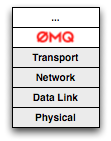 Berkeley Sockets (BSD) are the de facto API for all network communication. With roots from the early 1980's, it is the original implementation of the TCP/IP suite, and arguably one of the most widely supported and critical components of any operating system today. BSD sockets that most of us are familiar with are peer-to-peer connections, which require explicit setup, teardown, choice of transport (TCP, UDP), error handling, and so on. And once you solve all of the above, then you are into the world of application protocols (ex: HTTP), which require additional framing, buffering and processing logic. In other words, it is no wonder that a high-performance network application is anything but trivial to write.
Berkeley Sockets (BSD) are the de facto API for all network communication. With roots from the early 1980's, it is the original implementation of the TCP/IP suite, and arguably one of the most widely supported and critical components of any operating system today. BSD sockets that most of us are familiar with are peer-to-peer connections, which require explicit setup, teardown, choice of transport (TCP, UDP), error handling, and so on. And once you solve all of the above, then you are into the world of application protocols (ex: HTTP), which require additional framing, buffering and processing logic. In other words, it is no wonder that a high-performance network application is anything but trivial to write.
<p>
Wouldn't it be nice if we could abstract some of the low-level details of different socket types, connection handling, framing, or even routing? This is exactly where the <strong><a href="http://www.zeromq.org/">ZeroMQ</a> (ØMQ/ZMQ)</strong> networking library comes in: <em>"it gives you sockets that carry whole messages across various transports like inproc, IPC, TCP, and multicast; you can connect sockets N-to-N with patterns like fanout, pubsub, task distribution, and request-reply"</em>. That's a lot buzzwords, so lets dissect some of these concepts in more detail.
</p>
</blockquote>
<div class="posterous_quote_citation">
via <a href="http://www.igvita.com/2010/09/03/zeromq-modern-fast-networking-stack/">igvita.com</a>
</div>
<p>
Well written post about ZeroMQ. Lead to some interesting links about RabbitMQ, ActiveMQ the AMQ protocol, ICE (Internet Communications Engine) from ZeroC.
</p>
Berkeley Sockets (BSD) are the de facto API for all network communication. With roots from the early 1980's, it is the original implementation of the TCP/IP suite, and arguably one of the most widely supported and critical components of any operating system today. BSD sockets that most of us are familiar with are peer-to-peer connections, which require explicit setup, teardown, choice of transport (TCP, UDP), error handling, and so on. And once you solve all of the above, then you are into the world of application protocols (ex: HTTP), which require additional framing, buffering and processing logic. In other words, it is no wonder that a high-performance network application is anything but trivial to write.